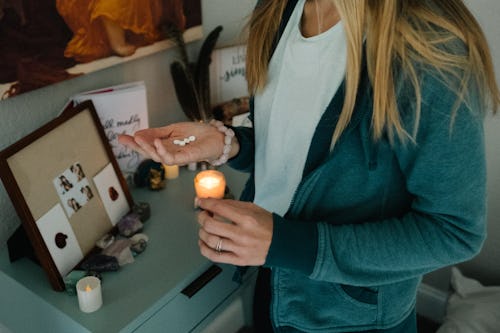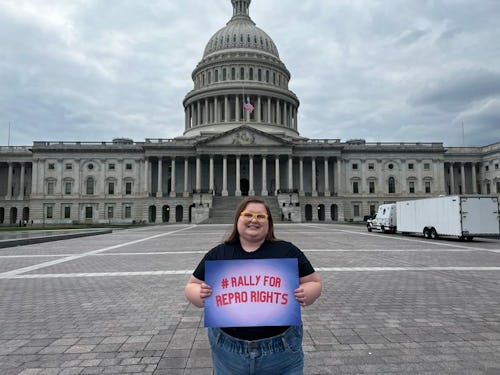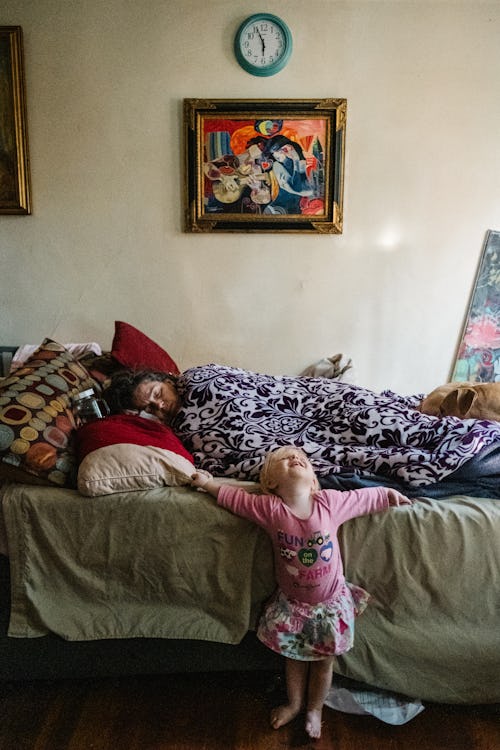
Our Streets is a column by writer and reporter Ray Levy Uyeda that highlights activists, artists, and organizers who are doing the work and reclaiming power for the people.
Abortion is normal and safe. About 1 in 4 people who can get pregnant will have an abortion in their lifetime. But abortion, or the intentional termination of one’s pregnancy, is also highly politicized in the U.S. A leaked draft of a Supreme Court ruling that vows to overturn a federal guarantee to abortion access has shown just how far conservatives will go to control people’s lives by withholding access to abortion care.
In 1973, the Supreme Court ruled in Roe v. Wade that patients had a right to pursue abortions, and that the conversation should stay between a patient and their doctor. A later 1992 SCOTUS ruling allowed states to implement their own laws related to abortion — and since 2010, Republican-led state legislatures have proposed hundreds of laws designed to constrict abortion access and stigmatize those who seek abortion care.
Abortion is still legal in the U.S., though for many people seeking the procedure is arduous, emotionally taxing, and expensive. Abortion doulas — individuals who are trained to offer support for patients seeking abortion — “stand between the person [they’re] assisting and the world,”says Ka’Lyn Coghill, an abortion doula based in Virginia. Mic spoke with three abortion doulas who shared what they’ve learned from their work and why it’s important to support everyone’s reproductive decisions. (Responses have been lightly edited and condensed for clarity.)
Ka’Lyn Coghill, she/her/they/them, Virginia
We have a lot of people who come from surrounding states to Richmond to get their abortion, so a lot of them need practical support as well. We work to provide lodging, food, childcare, and transportation. Sometimes people seeking abortions are not really sure of the process and what they’ll need after. They may search for information on Google or read some literature, but a lot of times the abortion doula’s job is to ask them, “Do you have childcare? Do you have a hot bath that you can take? What type of environment are you in?” All of these factors play a role when you get an abortion, but a lot of people don’t really think about that because these are things that are not widely discussed when we talk about abortion, especially if you’re not in reproductive justice circles.
“Doula work is liberation work — you have to be someone who is willing to stand between the person that you’re assisting and the world.”
Doula work is for transitions that people go through. It doesn’t have to look a certain way. It doesn’t have to fit a certain box. There are postpartum doulas, transition doulas; you don’t just have to be a doula for someone who’s experiencing a pregnancy or birth. Honestly, doula work is liberation work — you have to be someone who is willing to stand between the person that you’re assisting and the world because the world will have assumptions about that person who’s getting the abortion, and they’ll have assumptions about abortion laws and what abortion means and what it isn’t. And I’m not just an abortion doula for women. A lot of the time I have to correct people when I tell them what I’m doing because they’ll say, “Abortions are for women. So you’re doing it for women.” I’m like, “No, I’m doing it for people because people get abortions.”
Emily Harrison, she/her, Virginia
I began clinic escorting probably four or five years ago and started doing abortion doula work during the pandemic. I think a lot of people assume that every doctor who performs abortions is a hero, and I do believe that we should support abortion providers, but they’re not all practicing anti-racist or anti-oppression work; they are not all trauma-informed. A lot of the providers who I’ve worked with are old white dudes who have been performing these procedures since before Roe. I’m glad they did that work, but their bedside manner isn’t great. I was surprised at how well I handled it the first few times when a doctor made an offhand comment. I found that the best way to help patients in that moment is to connect with them — make that eye contact or hold their hand if that’s what they want, and just immediately move on. It’s not going to help the patient if I argue with the doctor. It’s better to shut down that conversation, connect with the patient, work on deep breathing, and talk about what they're going to eat after.

It’s so unfair what these patients are put through and it’s so hard to see their exhaustion. I had a patient who was coming from West Virginia. She worked at a bar so she was working from 9 p.m. to 3 a.m. In order to get to the clinic by 7 a.m. she had to go straight from her job at 3 a.m., and she hadn’t eaten for about 18 hours. She had to have her procedure awake, so she didn’t get most of the pain control that we provide, and then she had to get back in her car and drive straight back to work. That doula experience was hard for me to let go of. Why does it have to be this way? Why are we putting people through this?
Heather, she/her, Maryland
In 2019, I had my own medical abortion. Two of my friends who were both doulas supported me through it. It really moved me being able to have that kind of support for an experience that I was so scared to go through. I didn’t know what to expect from the experience because nobody really talks about their abortions, especially medical abortions where we take the pills at home. Just being able to have those two women surround me and care for me during that experience really shaped me as a doula. I knew from then on that I wanted to become a full-spectrum doula so that I would be able to support people having abortions as well. It is sacred and important work.
The Abortion Project came about after that experience. I have a background as a birth photographer, and have given birth myself a couple of times, and I was really blown away by how much my abortion was like a water birth. My partner in the project, Sarah, who also supported me through my abortion, ended up taking a couple of pictures with her cell phone during my abortion that helped me process what I had gone through. It helped me see details that I had missed. And it helped me share my story.

Eventually, we kind of sat down together and we had both independently been thinking that we needed to do something about medical abortion, but we didn’t know quite what it would look like. We went back to the fact that I had no idea what to expect during my abortion and that photographs really helped me process and prepare. So we thought, wouldn’t it be amazing if we had a photography project where we could show people what to expect? Or at least, prepare people to some degree because everybody's experience is different. We thought, if we could start showing what medical abortion actually looked like that could really change the conversation around it.







